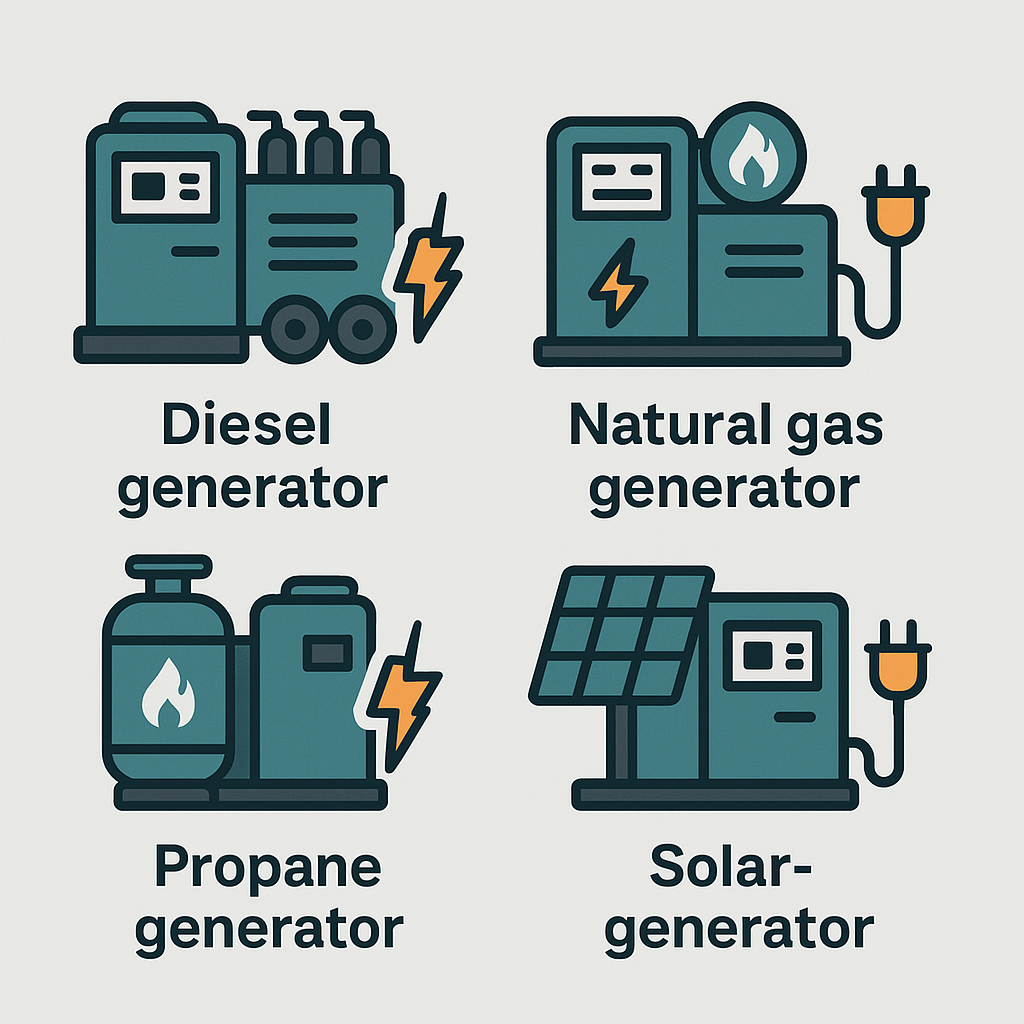EV Charging Generators: Compare the Best Options for Fleet Electrification


As the push toward fleet electrification accelerates, one critical challenge still holds many operators back: access to reliable charging infrastructure. Whether you’re managing a construction fleet, transit vehicles in rural areas, or facing utility delays at a depot, you may be exploring alternatives including the use of an EV charging generator.
But not all generators are created equal. In this guide, we break down the different types of EV charging generators, how they work, and which are best suited for fleet operations in real-world environments.
An EV charging generator is a mobile or stationary power system that supplies electricity to charge electric vehicles typically through a Level 2 or DC fast charger. These generators can run on diesel, natural gas, renewable fuels, or stored battery energy. Unlike traditional charging stations connected to the electrical grid, generators offer off-grid EV charging flexibility.
Fleet managers often deploy EV charging generators when grid connections are unavailable, too expensive, or delayed making them ideal for remote sites, temporary depots, and mobile operations.
Diesel-powered EV charging generators are the most widely used due to their availability and high power output. They’re rugged, portable, and capable of supporting both Level 2 and DC fast charging setups. However, they are also noisy and emit CO₂ and particulates which may be problematic for sustainability-driven fleets.
Best for: Remote projects, emergency backup, pilot EV charging setups
Pros: Readily available, powerful
Cons: High emissions, loud operation
Natural gas generators especially those powered by renewable natural gas (RNG) offer a cleaner alternative to diesel. They produce fewer emissions and operate more quietly, while still delivering the power needed for commercial EV charging. Companies like L-Charge use mobile, RNG-powered charging units to deliver fast, reliable service without needing grid access.
Best for: Clean fleet charging, grid-constrained urban sites
Pros: Lower emissions, quieter operation
Cons: Still combustion-based, requires fuel logistics
Battery-powered EV charging generators store electricity (charged in advance from the grid or renewables) and release it on demand. These mobile energy storage systems are silent, emission-free, and ideal for urban environments or noise-sensitive operations. However, they typically offer less runtime and slower recharge cycles compared to fuel-based generators.
Best for: Urban depots, event fleets, low-noise areas
Pros: Zero emissions, silent operation
Cons: Limited charging capacity, slower recharging
Solar EV generators pair photovoltaic (PV) panels with battery storage to provide fully renewable charging. These setups are best for static or semi-permanent deployments in sunny locations. While eco-friendly, solar generators often can’t support high-speed EV charging at scale and depend heavily on weather conditions.
Best for: Educational fleets, sustainability showcases, warm climates
Pros: 100% renewable, low maintenance
Cons: Intermittent output, large footprint, slow charging
Hydrogen-powered EV charging generators produce electricity through a clean electrochemical process, emitting only water vapor. They’re quiet and scalable, but access to hydrogen fuel and high costs remain significant barriers.
Best for: Government pilots, green hydrogen regions
Pros: Zero emissions, scalable for larger fleets
Cons: Expensive, limited fuel infrastructure
The right EV charging generator depends on your operating environment, emissions goals, and charging needs. Diesel and natural gas options offer fast, scalable charging in off-grid scenarios. Battery-based and solar EV generators suit fleets in quiet, low-emission zones. Hydrogen may suit long-term, future-focused pilots in the right regions.
Many fleets today deploy hybrid EV charging solutions combining off-grid generators with limited grid access or solar and battery storage to balance speed, sustainability, and cost.
Can a diesel generator charge an electric vehicle?
Yes, diesel generators can power Level 2 or DC fast chargers for EVs. They’re widely used in remote sites and mobile fleet operations but come with high emissions.
What’s the cleanest type of EV charging generator?
Battery-based or hydrogen fuel cell generators are the cleanest, as they emit no pollutants during operation. RNG-powered generators are also a sustainable choice with near-zero lifecycle emissions.
How fast can an EV generator charge a vehicle?
It depends on the generator’s capacity. Some mobile units can deliver 50kW to 180kW of power similar to public DC fast chargers.
Are EV charging generators legal on public roads or depots?
Yes, most mobile EV charging solutions comply with regulations, but local rules on emissions, fuel storage, and permitting may apply.
What’s the most flexible generator for EV fleet charging?
Mobile, RNG-powered generators offer a strong balance of speed, scalability, and sustainability ideal for grid-constrained or growing EV fleets.